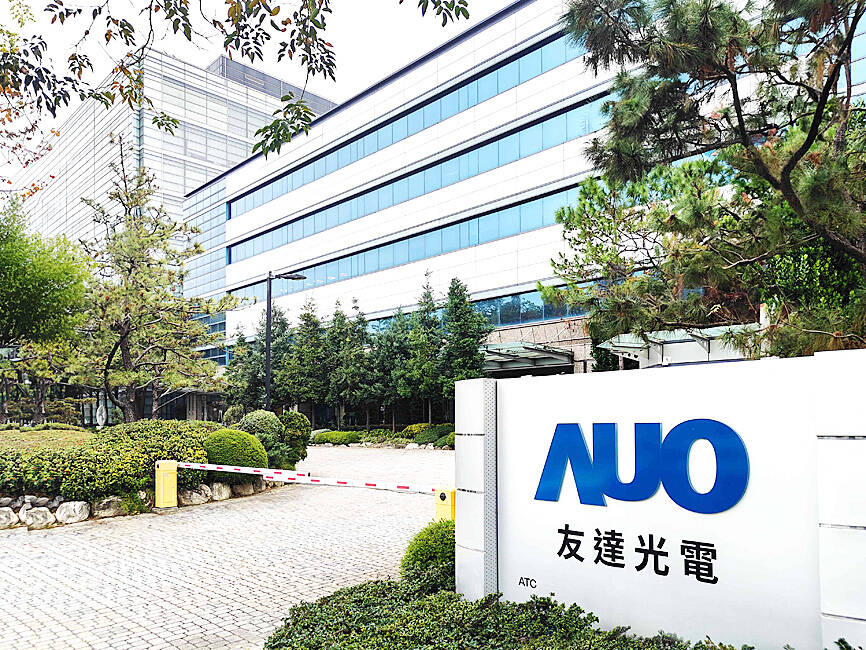AUO Corp (友達) yesterday said it has agreed to sell its idled manufacturing facility and land in Tainan to Micron Technology Inc for NT$7.4 billion (US$231.8 million) as the company shifts strategy to reduce the impact from the boom-and-bust flat-panel display industry.
The company expects to book NT$4.17 billion in disposal gains from the sale, it said in a Taiwan Stock Exchange filing.
The Tainan factory produced color filters used in monitors, notebook computers and flat-panel TVs before being shut down last year, as AUO sought to optimize its asset utilization.

Photo courtesy of AUO Corp
The company has been striving to diversify and broaden its business scope in the past few years to minimize the impact of the LCD industry’s volatility.
The company aims to boost sales contribution from its non-panel business to half of its total revenue by 2027, AUO chairman Paul Peng (彭双浪) said last month.
In addition to the Tainan plant, AUO also agreed to sell the facilities owned by its solar energy subsidiary AUO Crystal Corp (友達晶材) in Taichung for NT$700 million, the flat panel maker said in a separate filing. The deal would bring about NT$544 million in disposal gains for the company, it said.
Micron Technology, the world’s No. 3 memorychip maker, said in a statement yesterday that it plans to deploy new wafer testing capacity by converting AUO’s Tainan factory into a front-end wafer testing facility, which would support its DRAM chip manufacturing expansions in Taichung and Taoyuan.
Market researcher Trendforce Corp (集邦科技) said the transaction with Micron would help AUO improve its overall financial structure this year.
AUO has been in the red for more than two years and reported net losses of NT$3.76 billion in the first half of this year.

Shiina Ito has had fewer Chinese customers at her Tokyo jewelry shop since Beijing issued a travel warning in the wake of a diplomatic spat, but she said she was not concerned. A souring of Tokyo-Beijing relations this month, following remarks by Japanese Prime Minister Sanae Takaichi about Taiwan, has fueled concerns about the impact on the ritzy boutiques, noodle joints and hotels where holidaymakers spend their cash. However, businesses in Tokyo largely shrugged off any anxiety. “Since there are fewer Chinese customers, it’s become a bit easier for Japanese shoppers to visit, so our sales haven’t really dropped,” Ito

The number of Taiwanese working in the US rose to a record high of 137,000 last year, driven largely by Taiwan Semiconductor Manufacturing Co’s (TSMC, 台積電) rapid overseas expansion, according to government data released yesterday. A total of 666,000 Taiwanese nationals were employed abroad last year, an increase of 45,000 from 2023 and the highest level since the COVID-19 pandemic, data from the Directorate-General of Budget, Accounting and Statistics (DGBAS) showed. Overseas employment had steadily increased between 2009 and 2019, peaking at 739,000, before plunging to 319,000 in 2021 amid US-China trade tensions, global supply chain shifts, reshoring by Taiwanese companies and

Taiwan Semiconductor Manufacturing Co (TSMC, 台積電) received about NT$147 billion (US$4.71 billion) in subsidies from the US, Japanese, German and Chinese governments over the past two years for its global expansion. Financial data compiled by the world’s largest contract chipmaker showed the company secured NT$4.77 billion in subsidies from the governments in the third quarter, bringing the total for the first three quarters of the year to about NT$71.9 billion. Along with the NT$75.16 billion in financial aid TSMC received last year, the chipmaker obtained NT$147 billion in subsidies in almost two years, the data showed. The subsidies received by its subsidiaries —

Taiwan Semiconductor Manufacturing Co (TSMC) Chairman C.C. Wei (魏哲家) and the company’s former chairman, Mark Liu (劉德音), both received the Robert N. Noyce Award -- the semiconductor industry’s highest honor -- in San Jose, California, on Thursday (local time). Speaking at the award event, Liu, who retired last year, expressed gratitude to his wife, his dissertation advisor at the University of California, Berkeley, his supervisors at AT&T Bell Laboratories -- where he worked on optical fiber communication systems before joining TSMC, TSMC partners, and industry colleagues. Liu said that working alongside TSMC